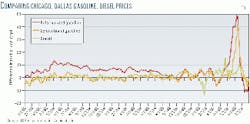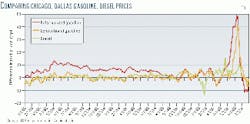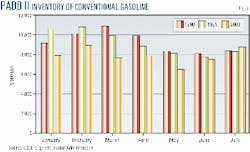API: FTC gasoline price inquiry exonerates industry
A US Federal Trade Commission report "exonerates" the oil industry of allegations that it sought to drive up Midwest gasoline prices last summer, the American Petroleum Institute contends.
API Pres. and CEO Red Cavaney said, "This finding joins the list of past government investigations that have exonerated our industry-and it vindicates the thousands of men and women who worked around the clock to rush fuel from other regions to help meet Midwest demand," Cavaney said in a press briefing late last month.
FTC capped a 9-month investigation with a report stating that it found no "credible" evidence of collusion or antitrust behavior by oil companies in the gasoline price spikes last spring and summer.
Boutique fuels
Cavaney said a repeat of last summer's regional gasoline price and supply problems is unlikely, adding, "but you can never discount that other problems could occur," such as refinery outages or other unforeseen issues.
API said it and some of its individual members are talking with government policymakers on ways to avoid future price spikes. A group of Midwest refiners met via conference call with the US Environmental Protection Agency last month to anticipate inventory issues related to reformulated gasolines, Cavaney noted.
The presence of dozens of "boutique" fuels to accommodate individual state clean air implementation goals is one item that must be addressed, he added.
API advocates a regional clean fuels approach, saying multiple fuel specifications make it difficult for suppliers to swing production to different markets when shortages occur.
But if or when EPA would be amenable to that strategy is an open question. Re- tooling clean fuels would require reopening the Clean Air Act, and no one in Congress appears to have the stomach for it, given how closely divided the legislature is.
Another short-term approach for refiners may be for EPA to offer temporary waivers on seasonal fuels specifications in times of market tightness, Cavaney offered. Expediting permitting of new refining facilities is another short-term goal.
He said that, in the long term, increasing US energy supply will help mitigate price shocks. Accomplishing that goal will take 5-10 years, assuming the government moves this year to expand industry's access to public lands and reconsider the way power plants and refineries are permitted.
FTC report
FTC approved its report Mar. 30 on a vote of 5-0. Earlier, Rep. Billy Tauzin (R-La.), chairman of the House Committee on Energy and Commerce, had disclosed the results of the inquiry (OGJ Online, Mar. 1, 2001).
The report confirmed earlier statements that a number of factors contributed to the Midwest region's price spike (Fig. 1). They included pipeline problems, refinery constraints, and low inventories (Fig. 2).
Clean fuels rules that required refiners to add oxygenates such as ethanol or methyl tertiary butyl ether exacerbated the problem but were "secondary" factors, the report said. Refiners were often constrained from using the more easily available ethanol because of federal rules that require special blendstocks to account for the oxygenate's higher volatility.
However, FTC did not completely exonerate marketers.
"Most of the causes were beyond the immediate control of the oil companies. There were, however, some strategic choices by some oil companies designed to maximize profits that contributed to the temporary price increases," said FTC Chairman Robert Pitofsky.
The report said, "Although the principal causes of the price spike were largely beyond the immediate control of industry participants, the industry as a whole made errors in supply forecasts and underestimated the potential for supply shortages in the Midwest in the spring and early summer 2000."
According to the report, "Once prices spiked, several firms acted quickly to increase production and to ship additional gasoline into the Midwest, thus moderating the severity of the price spike. Several other firms, however, delayed shipments of additional products into the Midwest in the expectation that prices would soon abate."
The agency also cautioned that price increases are likely to recur because market fundamentals have not changed from last year. "Unless gasoline demand abates or refining capacity grows, price spikes are likely to occur in the future in the Midwest and other areas of the country," the agency said.
Reactions
Responding to the report, House Committee on the Judiciary Chairman F. James Sensenbrenner Jr. (R-Wis.) said that, despite FTC's final conclusions, the evidence in the report finds clean fuels were a "major" contributing factor to the price spikes.
FTC Commissioner Orson Swindle endorsed Sensenbrenner's view that clean fuels had a major role to play, noting in a statement that he had a "grave concern, not with the method of investigation or the factual findings of the final report, but rather with the way these findings are being characterized."
Swindle observed that the report found that prices rose "because of factors beyond the industry's immediate control," perhaps the most important of which was "a change, mandated by the Environmental Protection Agency, from one formulation of gasoline [RFG I] to another formulation [RFG II] that caused unforeseen production difficulties."
Swindle also said, "It is unfair to try to assign blame to industry participants-directly or through insinuation-for undertaking varying responses to these market factors."


